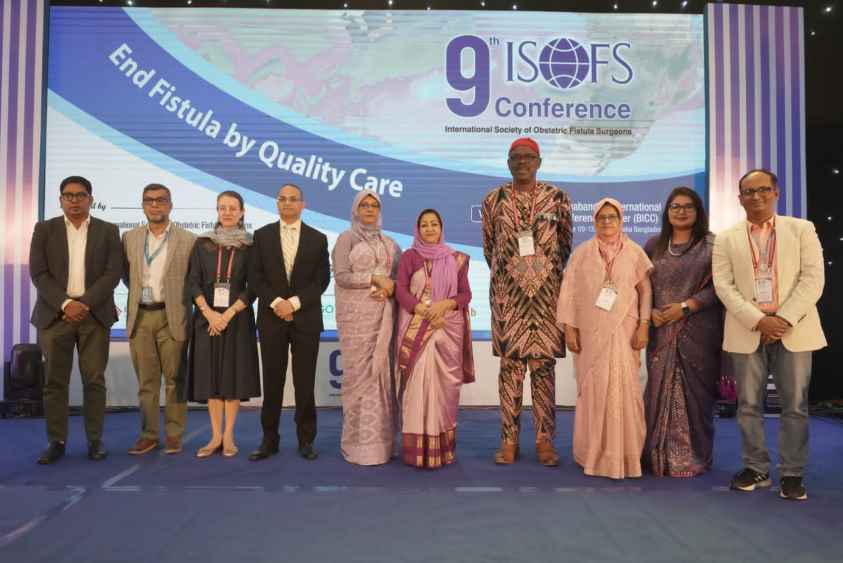
The 9th International Society for Obstetric Fistula Surgeons (ISOFS) Conference, a dynamic three-day event, began on 11 December 2024 in Dhaka, bringing together over 500 delegates, including 167 international participants from 35 countries, to focus on the global challenge of eliminating obstetric fistula This significant gathering provided a critical platform for dialogue, knowledge sharing, and reaffirmed commitments to achieve the goal of eradicating fistula by 2030.
Each year, globally, there are up to 500 000 new cases of obstetric fistula and over 2 million girls and women worldwide are estimated to be living with untreated fistulas.
During 1st day of the three-day (11-13 December) conference, the International Obstractic Fistula working group meeting was held to finalizethe global roadmap for ending obstetric fistula by 2030. During this conference delegates engaged in various forums and panels, recognizing that ending fistula transcends healthcare interventions. It is a mission to restore dignity, dismantle barriers, and transform the lives of millions of women and adolescent girls. Participants deliberated on actionable recommendations to elevate the issue to policymakers and other stakeholders, aiming for impactful and sustainable solutions. Representatives from UNFPA, USAID, MOMENTUM, FIGO, OGSB, and the Ministry of Health and Family Welfare, Bangladesh, participated in different sessions.
An inspiring testimony from a fistula survivor in Bangladesh stood out, symbolizing resilience and hope. These moments underscored the importance of collective action, reinforcing the global determination to eliminate obstetric fistula and restore the health, dignity, and rights of affected women and girls. In speakers and the participatory countries showcased a distinguished assembly of global leaders, experts, and advocates dedicated to the cause.
approximately 20,000 cases in Bangladesh alone. This debilitating condition arises from prolonged, obstructed labor without timely.
UNFPA Representative a.i., Masaki Watabe, mentioned “the prevention of fistula is intrinsically linked to the provision of quality maternity care. This encompasses ensuring prompt access to midwife-led antenatal care, skilled birth attendance, institutional deliveries, and emergency obstetric care. In humanitarian emergencies, where childbirth persists, it is vital to equip birth attendants with the skills needed to provide emergency obstetric care, thus playing a crucial role in fistula prevention”.
The conference presents a crucial platform for fistula surgeons and stakeholders to collaborate, strategize, and chart a definitive course towards eradicating obstetric fistula on global, regional, and national levels.
UNFPA’s Chief of Health delivered a keynote address titled “End Obstetric Fistula: National Progress Over the Past Five Years and Future Directions in Bangladesh,” highlighting notable advancements in the country’s fight against fistula. The presentation also outlined strategic priorities to accelerate progress and drive impactful outcomes in the years ahead.
This year’s ISOFS Conference serves as a catalyst for strengthened global collaboration. It emphasizes the need for coordinated strategies and resource alignment to realize a fistula-free world. The conference highlights the importance of addressing obstetric fistula as a fundamental aspect of improving maternal health and upholding women’s rights.
This conference represents a pivotal step forward in the global campaign to end obstetric fistula, reaffirming the shared commitment to creating a future where no woman or girl suffers from this preventable condition. About Obstetric Fistula: Obstetric fistula is a devastating childbirth injury caused by prolonged, obstructed labor without timely medical intervention. It leaves women incontinent, socially stigmatized, and often isolated. Ending obstetric fistula is a global priority to restore dignity, health, and well-being to affected women and girls.



